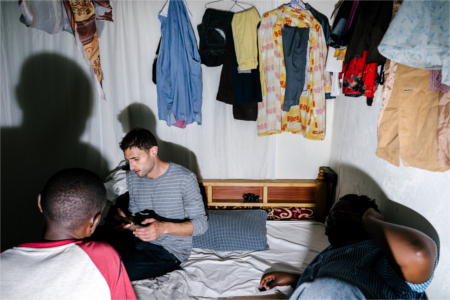
Kushner interviews two refugees in Nairobi: Cynthia, a lesbian who fled Burundi, and Sulait, a gay man from Uganda. Both have resettled abroad. Photo: Jake Naughton
Jacob Kushner is an independent journalist who writes about migration, conflict, extremism, foreign aid, corruption and human rights abuses in East and Central Africa, the Caribbean and Germany. His work has appeared in a range of media, including The New York Times Magazine, National Geographic, Harper’s, The Atlantic, VQR, Outside Magazine, Newsweek, The Associated Press and the L.A. Times, among many others. Kushner won the OPC Foundation’s Nathan S. Bienstock Memorial Scholarship in 2013. He is a 2019 Logan Nonfiction Fellow at the Carey Institute for Global Good. Kushner wrote about “solutions journalism” for the OPC’s Dateline magazine this year.
Hometown: Milwaukee, Wisconsin.
Education: University of Wisconsin-Madison (B.A., Journalism & Latin American Studies); Columbia University (MA, Journalism – Politics).
Languages you speak: Haitian Creole, Dominican Spanish, conversational German, and cringeworthy French.
First job in journalism:
Writer/Editor of my high school newspaper, Ripples. First paid gigs: Editor of La Comunidad News, a Spanish community newspaper, and Intern at The Wisconsin Center for Investigative Journalism.
Countries reported from: Kenya, Uganda, Tanzania, Congo, Germany, Haiti, Dominican Republic.
When and why did you join the OPC:
After reporting my master’s thesis in Congo, I wanted to go back to east or central Africa, so I applied for an OPC Scholarship. I was awarded the Nathan S. Bienstock Memorial Scholarship, which sent me to Nairobi, Kenya to intern with The Associated Press. As a freelancer, OPC’s annual events and vast network have helped me connect with editors to whom I’ve pitched stories from around the world. But the best part is getting to know the young OPC Scholars – each group seems more ambitious than the last, and their enthusiasm rekindles my own.
What drew you to reporting on migration?
A longtime source of mine once tried to convince me that “We are all refugees, wherever we are. Anything could happen tomorrow, and I’d have to be on the run.” But my life couldn’t be more different, I countered – there’s nothing on the horizon forcing me to flee. His concept of home was so impermanent: “No matter how much you want a place to be home, it’s not going to be forever.” I think what draws me to people in flux is the chance to understand a nomadic life that’s so different from my own. “That’s one thing I learned – not to get hung up about home,” he told me. “To make home wherever you are. To not have too many expectations.” That last phrase stuck with me – the idea that the world’s displaced may have given up expecting anything from the rest of us. I hope that my reporting draws some attention to their plight.
Best journalism advice received:
Print their names. Don’t just blame a department, or agency, or ‘Congress.’ Find the people who are responsible – and print their names.
Worst experience as a journalist: After the Westgate Mall Terrorist attack in Nairobi, watching reporters at the city morgue shove their cameras in the faces of grieving family members who’d just discovered their loved ones had died. That was journalism at its worst. It doesn’t need to be that way.
When traveling, I like to …
Crash on the couch. Hotels can be boring; an evening spent with friends or sources, never.
Hardest story: A radio series I did about Fabienne Jean, a dancer who lost her leg in Haiti’s 2010 earthquake. Following the money that the U.S. pledged to ‘rebuild Haiti’ wasn’t easy, but far harder was conveying just how difficult it is to rebuild a single life.
Journalism heroes: Rukmini Callimachi, Anthony Shadid, May Jeong, Jina Moore. Edwidge Danticat, Jiayang Fang, Raoul Peck.
Advice for journalists who want to work overseas: Don’t parachute – plummet. Move somewhere and stay a while.
Dream job: NatGeo wildlife videographer. (At least, the way I imagine it).
Favorite quotes:
“Those who write about Europe have a comfortable life.”
– Ryszard Kapuściński.
“Pale franse pa fè ou entelijan.”
Speaking French doesn’t make you smart. (Haitian proverb)
Most over-the-top assignment: Watching from a helicopter as Kenyan wildlife rangers chased down elephants to tranquilize them and tag them to track their migration. (National Geographic).
Most common mistake you’ve seen: More enthusiasm for being on the frontlines than willingness to investigate those responsible for creating them.
Countries you most want to return to: Uganda to hike the Rwenzoris, South Africa to camp in Drakensburg, Russia to skate on Lake Baikal, and Congo – to finally finish learning French.
Twitter handle: @JacobKushner
